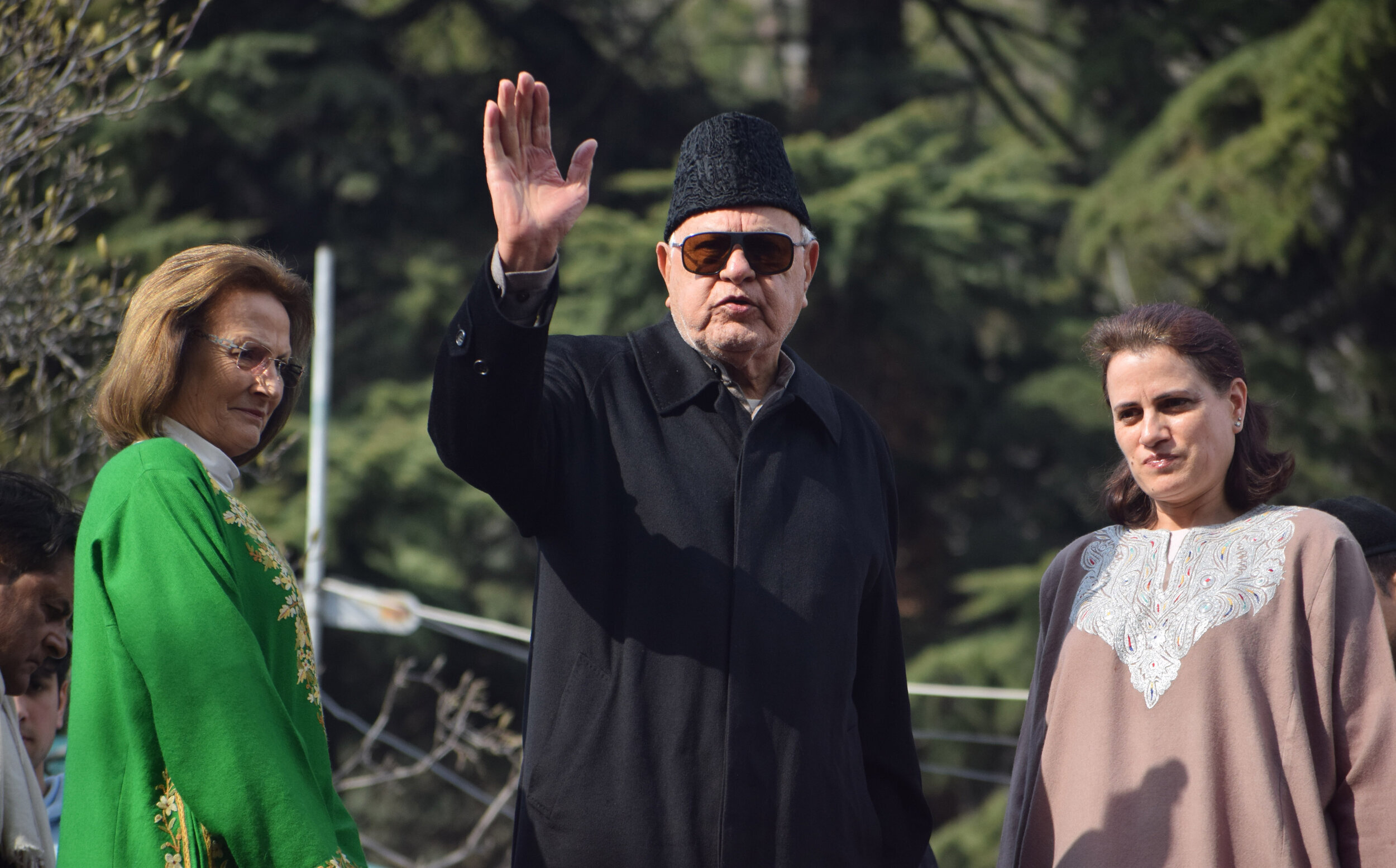Local elections in Kashmir show strong opposition to Modi
Farooq Abdullah (center) is the former chief minister of Jammu and Kashmir, current member of parliament and president of the People’s Alliance For Gupkar Declaration. Here he is seen Mar. 13, 2020 as he was released by the Indian government from house arrest. He was under “preventative detention” since Aug. 5, 2019. Photo by Basit Zargar.
SRINAGAR — India’s ruling Bharatiya Janata Party lost local elections in Jammu and Kashmir Dec. 23 to a rare local political alliance that wants to reverse the sweeping constitutional changes made to the Muslim-majority region that opened it up for greater Hindu settlement, a severe lockdown and arbitrary detentions.
Kashmir-based political parties put aside their differences to form the People’s Alliance For Gupkar Declaration (PAGD), explicitly to fight the BJP.
Read: Kashmir Goes To The Polls For First Time Since India Stripped Autonomy
The Indian parliament, led by Prime Minister Narendra Modi’s BJP government, revoked Kashmir’s semi-autonomous status in August 2019, arguing doing so would bring business development, end a decades-long separatist movement allied with Pakistan and unite the region more to India. Kashmir acceded to India at the time of its independence in 1947 rather than merge with a Muslim Pakistan, with a constitutional provision that allowed semi-autonomous rule.
Read: Why India Is Evicting Muslims From Forests In Kashmir And Axing Thousands Of Trees
Local Kashmir-based parties say the motive behind ending Kashmir’s special status was to erode the region's unique identity and change its demographics. The Himalayan valley’s 7 million people are 97% Muslim.
Jammu and Kashmir’s 280 constituencies went to polls in eight phases starting Nov. 28, with votes counted on Dec. 22. The PAGD won more than 110 seats while the BJP won just 75. Most of the PAGD’s seats were from the Kashmir valley, while the BJP’s were from Jammu, a populous Hindu-dominated district south of the valley. Many of the Hindus living in Jammu fled violence from Islamic militants in Kashmir in the ‘90s.
After the results showed a clear majority for PAGD, former Chief Minister of Jammu and Kashmir Mehbooba Mufti and vice president of PAGD tweeted that the Kashmiri people have rejected the “unconstitutional decision” to scrap Kashmir’s special status.
“They have overwhelmingly supported PAGD which stands for restoration of Jammu and Kashmir’s special status,” Mufti said.
Former Chief Minister of Jammu and Kashmir Omar Abdullah also tweeted his support.
“The PAGD is an alliance that emerged out of betrayal of the people of J&K on 5th August 2019,” he said. “We have faced every obstacle- illegal detentions, agency threats and pressures, our candidates were locked up to stop them campaigning and from all this we are emerging victorious… All of us in the PAGD are deeply indebted and grateful to the people of J&K for your support at this critical juncture. We reaffirm our commitment to use all democratic and legal weapons at our disposal to continue to fight for our rights.”
The sense on the ground is that PAGD’s unexpected entrance into the election and winning a majority has disrupted the BJP’s plan to make local parties irrelevant.
“It is a good sign, at least a starting point for reversing the disempowerment of people of Kashmir,” said Darakshanda, a research scholar from Kashmir University.
“It is clearly goes much beyond symbolism,” said Arshid Iqbal, an engineer in Srinagar. “But the onus is on Kashmiri leadership to deliver for getting back Kashmir’s special status.”
The government had deployed 25,000 additional personnel of the Central Armed Police Force (CAPF) ahead of the election. But a day before the counting the PDP alleged that three of its senior leaders were detained by the police.
During local campaigning, security forces allowed BJP candidates to campaign door to door in villages while local candidates were detained. The BJP called the PAGD a “gang” and painted the alliance as an anti-national movement.
“The Gupkar Gang [PAGD] is going global! They want foreign forces to intervene in Jammu and Kashmir,” tweeted Amit Shah, Union Minister in the BJP government, on Nov. 16. “The Gupkar Gang also insults India’s Tricolour [flag].”
Farooq Abdullah, another former chief minister of Kashmir, was appointed as the president of the PAGD alliance. Abdullah said the alliance is not ant-national but “anti-BJP”.
Pertinently PAGD candidate and the local Peoples Democratic Party leader Waheed Parra won defeating his nearest rival Sajad Ahmad Raina of the BJP. Parra was arrested by the National Investigating Agency of India (NIA) on Nov. 25, a day after he announced he would run in the election, accused of supporting separatist militants.
Mufti shared on Twitter that Parra’s arrest meant the party couldn’t campaign for him.
“I was illegally detained thrice over the course of a fortnight,” she said. “PAGD candidates were locked up in a government building while others barred from canvassing. Despite all these obstacles PAGD emerged as winners. This has been a hard-earned victory for us all.”
Zaffar Iqbal is a journalist based in Kashmir, India. He has reported for 18 years on armed encounters, environmental issues, crime, politics, culture and human rights. He’s formerly the bureau chief of Jammu and Kashmir for NDTV.

